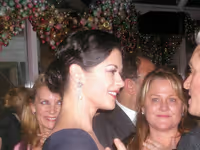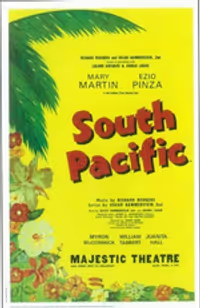My Fair Lady Ending
After Eight
Broadway Legend Joined: 6/5/09
#75My Fair Lady Ending
Posted: 3/24/18 at 7:08am
"As with most posters, after8 doesn't want to have his mind changed, "
Then I fit right in around here.
"he wants to be right."
Doesn't everyone?
The question is whether one is or isn't.
#76My Fair Lady Ending
Posted: 3/24/18 at 9:14amBut After Eight, didn't you feel any guilt at all when you forced Harry Potter to carve "I MUST NOT TELL LIES" into his own forearm?
#77My Fair Lady Ending
Posted: 3/25/18 at 7:01pmSaw it this afternoon. What a wondrously beautiful production that is also grounded in humanity. I loved the ending. My interpretation is that when Higgins listens to the recording of Eliza’s speech and his reprimand, the “perfect” lady that Higgins wanted to transform Eliza into comes, which, as we’ve established, is his imagination. This lady does all Higgins wants a lady to behave. But as she holds his face, Higgins finally comes to the understanding a lady does not possess a soul as fierce or free as Eliza’s that makes him crazy about her. As the “perfect” Eliza leaves, so is Higgins’s inhumane understanding of what constitutes a lady. And it gives him the redemption that is way better than a romantic make-up.
#78My Fair Lady Ending
Posted: 4/20/18 at 7:49am
The excitement of opening night had me thinking more about this revival and its ending, specifically whether it's in Higgins's mind or whether Eliza really comes back.
I don't see the final scene at all as being played as if it's in Henry's mind.
I was almost convinced by the argument that Eliza's leaving the house through "the wall" suggested that what we were watching was Henry's daydream.
But there's a reason why I ultimately disagree.
One of my favorite moments in this revival is the segue from the ball to Henry's house. We see Eliza leaving the ball alone, downstage with the house far upstage. And we see Eliza entering the house through the same "wall" she ultimately makes her final exit from (with, as I recall the house meeting her halfway).
Certainly Eliza's return home after the ball isn't in Henry's imagination. Sher has, in staging Eliza's return home from the ball, not only given us a gorgeous stage picture by itself, but exquisitely set up the final curtain.
As to why Eliza comes back after the climactic scene at Mrs. Higgins's house, to me it was clear. She is giving Henry one more chance. He neither passes this test nor fails it. He is simply true to himself. Eliza's response? She is true to herself. She understands and loves him but now knows for certain that there is no longer any place for her in his house.
In his life, as Shaw himself fully acknowledged, is another question, and one we are left with.
#79My Fair Lady Ending
Posted: 4/20/18 at 8:15am
Thank you for sharing that truly beautiful insight, henrikegerman. I’ve loved the way Sher stages that moment of Eliza’s return after the ball as a stand-alone few seconds of silence and focus on Eliza’s growth and pride—never thought to relate it to the finale, but you’re absolutely right. How gorgeous and even more profound.
I also love how you phrased both character’s mindsets in the finale. I couldn’t agree more. This production’s ending couldn’t be more perfectly staged and more fitting for these particular characters after everything that’s happened.
#80My Fair Lady Ending
Posted: 4/20/18 at 9:41am
I had the same thoughts as Henrik about the 4th wall/the final blocking. I noticed the same "break" after the ball, and actually that Higgins did it as well (after the scene at the mothers?) WOULD I have noticed it had I not been aware of it through this thread? No idea, actually.
#81My Fair Lady Ending
Posted: 4/20/18 at 9:43am
Thank you Broadwayconcierge and Dramamama, and Dramamama, I wasn't aware that Henry had a similar entrance. Longing to see this show again soon. The more I think about this production, the more I'm in its spell.
Also it''s now plainly clear to me how potent a choice it is to show (granted, at sacrifice of realism) Eliza returning alone after the ball. It firmly sets up her isolation from the rest of the household from the very onset of the "You Did It" scene. Sher is a master of semiotics. Later, thinking about what we've seen, what was in performance so aptly and artfully veiled so as not to call attention to itself and away from the show, can become clear, resonantly illuminating the show in reflection.
#82My Fair Lady Ending
Posted: 4/20/18 at 2:48pm
When Congress passed the new federal copyright law in 1976, superseding the laws in all the states, they did not include protection of stage directions or stagecraft among the list of protected content. However that list was non-exclusive. No federal judge has held that stage directions are entitled to copyright protection, but from several non-binding comments in court cases, it is thought that stage directions are protected as part of the licensing of a play. And the playwright or publisher of a play can explicitly include stage directions in any licensing agreement with a producer.
Myself, I thought that it was out of character for Eliza to make the trip to Higgin's home just to turn her back on him and walk out. The "slippers?" Did Eliza expect Higgins to have changed overnight? She knew what he was.
But this point can be debated (and is being debated) forever.
Some might be surprised that after the contentious break between Eliza and Higgins that Shaw might see any further connection between the two as unlikely, unproductive and unhappy.
Yet, although marriage between the two is forbidden,
Eliza's instinct tells her not to marry Higgins. It does not tell her to give him up. It is not in the slightest doubt as to his remaining one of the strongest personal interests in her life.
This quote is from the prose Epilogue that Shaw tacked on to the end of Pygmalion in reaction to theater owners inventing an audience-pleasing romantic end to the play.
mpkie
Broadway Star Joined: 6/21/15
#83My Fair Lady Ending
Posted: 4/22/18 at 6:11pm
I read Pygmalion and My Fair Lady in middle school and watched the movie in class about 2 decades ago. I didn't *think* it made any impression on me but apparently I could remember names of main characters and quotes after all this time. Where does my brain store this stuff? Fascinating!
Months ago when I bought the ticket, I "remembered" the two main characters had a "love story" that was felt creepy to me even as a kid, recalling she was about 20 and he in his early 40s, and that he was a total ass made it much worse.
While I was watching it come to life (by the way, what an amazing glorious feeling), I had a "sudden" recollection that they DO NOT end up together. So that's how I "predicted" and subsequently interpreted the ending, that they were never *meant* to be together.
The two leads, though, have good chemistry, so it was hard not to root for them. Plus Harry Hadden-Paton is dead sexy as Higgins (stupid sexy Higgins!).
Anyhow, I thought it was very touching ending... I interpreted that she stayed loyal to him by coming back, but was free in her own way by leaving (she's literally coming and going as she pleases). "Eliza, where the devil are my slippers" was more of a sentimental comment to a friend, rather than a command to a subordinate.
The musical somehow manages to have romantic undertones while still remaining platonic. I disagree that it needs to be strictly romantic.
Maybe I'll read through some of my dilapidated 20 year old copy and see how I feel then...
VintageSnarker
Broadway Legend Joined: 1/30/15
#84My Fair Lady Ending
Posted: 5/28/18 at 6:51pm
I want to see the show again, both because I mostly enjoyed it and because I want to get a full picture of the direction instead of the moment to moment critique I was engaged in during my first viewing. In case it's unclear from my posts, I am a feminist and relatively progressive. I wasn't angry at the ending and I didn't find the show or the direction offensive. But neither did I find it that uplifting or powerful.
Frankly, I thought the ending was a cop out. Maybe they thought it looked better for her to make her exit that way based on the configuration of the theater. But to me, that exit felt like taking a "third option" that did not at all exist in the world of the play. To me, it avoided making a comment either way by leaving the world of the play. It had the same laziness as having the suffragettes march on stage. If you're going to say something, have the courage to say something. Don't make a vague gesture that I have to all the work to try and interpret favorably and then expect a pat on the back.
ScottyDoesn'tKnow2
Broadway Legend Joined: 1/22/14
#85My Fair Lady Ending
Posted: 5/28/18 at 7:54pm
I thought the suffragette part was more of a wink to the movie that also had suffragettes during "Little Bit of Luck". I always thought that was entertaining because the film came out at the same time as Mary Poppins and they seem to take place in a similar time period and both had scenes showing suffragettes (well Winnie in Mary Poppins was one and had a whole song about it).
Updated On: 5/28/18 at 07:54 PM#86My Fair Lady Ending
Posted: 5/28/18 at 8:45pm
VintageSnarker said: "I want to see the show again, both because I mostly enjoyed it and because I want to get a full picture of the direction instead of the moment to moment critique I was engaged in during my first viewing. In case it's unclear from my posts, I am a feminist and relatively progressive. I wasn't angry at the ending and I didn't find the show or the direction offensive. But neither did I find it that uplifting or powerful.
Frankly, I thought the ending was a cop out. Maybe they thought it looked better for her to make her exit that way based on the configuration of the theater. But to me, that exit felt like taking a "third option" that did not at all exist in the world of the play. To me, it avoided making a comment either way by leaving the world of the play. It had the same laziness as having the suffragettes march on stage. If you're going to say something, have the courage to say something. Don't make a vague gesture that I have to all the work to try and interpret favorably and then expect a pat on the back."
You might want to read Holdren's review. She spelt out pretty much everything I thought about the production the three times (so far) I saw it. http://www.vulture.com/2018/04/theater-review-an-unaccustomed-new-approach-to-my-fair-lady.html
#87My Fair Lady Ending
Posted: 6/3/18 at 1:55pm
Only because there has been some previous discussion in this thread about how one's age, sex and sexual orientation might possible impact one's view of the subject matter, by way of background I'm a straight male senior citizen who has never read Pygmalion. I saw this production last night and will confine my thoughts to to its ending (though in short I thought the entire thing wonderful.) And I'm also the kind of guy that cries at RomCom movies. In other words, I too love happy endings.
I knew going in that there had been much written about the ending but I avoided reading anything about it as I wanted to experience it for myself, not knowing how it "came out." So as I was sitting there during the last scene, I was saying to myself, "Don't go back to him Eliza, don't do it." I did not think this because I thought Higgins to be any type of monster, as I didn't. He was who he was, a man pretty much set in his ways, as confirmed by both his mother and by his "Now where the devil are my slippers?" final line.
But my hope was based on the simple fact that Higgins thought of Eliza as his "possession", as in someone whom he had created, and as such, believed in his heart that she would and should always be submissive to him. What he failed to understand, in my view, that Eliza was someone in whom he had created self-respect. And that was how I hoped Eliza would view the situation as well, and it turned out that she did. She knew, in her heart, that if she stayed with Higgins she'd always be, in his eyes, a guttersnipe that he had "cleaned up" and made presentable, but that she was someone who would never have Higgins' respect.
I don't think she ran back to Freddie, because just as Higgins did not have respect for her, she did not respect Freddie enough to want to spend her life with him. Sure, she had feelings of affection for him, but she saw herself, finally, as someone who deserved more out of life. And so, it was, to me, a happy ending after all because I felt she'd have the life she deserved.
#88My Fair Lady Ending
Posted: 6/3/18 at 2:02pm^I agree. I thought this production had a truly happy ending with Eliza, quite literally, running off into the sunset as an empowered woman ready to take on the world. She don't need no man.
#89My Fair Lady Ending
Posted: 6/3/18 at 3:01pm
/ Well. she may not need no man but she certainly wants one, as evidenced by "Show Me." But that man ain't no Henry Higgins (or, for that matter, Freddie.)
FranklinDickson2018
Stand-by Joined: 4/6/18
#90My Fair Lady Ending
Posted: 6/3/18 at 6:21pm
I saw this from house seats and I had the fortune of Eliza walking right by me as she made her exit.
(My Eliza BTW was Kerstin Anderson - who did a splendid job)
First of, I have never heard such a hush during the moments of silence that preceded Eliza's exit. The theater was waiting with collective breath held to see what would happen.
And when Eliza walked by me --- she had a wonderful half grin on her face, it was almost an expression of triumph -- or victory. At least that is how I perceived it!!
Just wonderful to be so close to the performer to see this nuanced reaction.
deislily
Swing Joined: 10/21/18
#91My Fair Lady Ending
Posted: 10/21/18 at 10:45pm
I just saw the show this past Friday, Ambrose's final Friday night performance. I thought the show was magnificent.
I had a question for those who saw it much earlier. My Higgins was Michael Halling (Hadden-Paton is out on extended absence). Much has been made of the choices made for Eliza in the final scene, but I'm curious to know if the choices for Higgins have been there since previews. Specifically (and I haven't seen it done this way before), Higgins is mouthing along with Eliza's vowel noises on the phonograph, and visibly (though silently) berating himself for his "deliciously low, horribly dirty" comments. I thought it added quite a lot to the pathos of the scene. Has it been staged this way all along? Thank you all kindly.
#92My Fair Lady Ending
Posted: 10/22/18 at 9:52am
What you say is interesting, deislily, although I can't answer your question. I was there for Lauren's final performance yesterday before a sold out house, and I regretted that Harry was off. This was my fifth time and the previous time that I had seen the show I had gotten the impression that Harry was softening Higgins, and making him more sympathetic. I guess I'm referring to the last confrontation at his mother's house. I thought that he was less bellicose and seemed genuinely shaken a bit when he said that he hadn't known that she would be not be staying at his house.
(As the curtain call ended, I told the woman on my left that I had seen the show five times. She countered that she had seen it nine times and then, as a justly proud parent, told me that she was Lauren's mother. Well, she had the straight red hair. I wish I had known earlier as there were many questions I would have liked to ask. As it was, in the minute or so that we talked she repeated several times that Lauren had really wanted to make this movie.)
By this point Higgins had totally fallen for Eliza. He jealously raves about her choosing Freddy over him and imagines his revenge. Then he sings his love song. Sinatra used to refer to George Harrison's "Something" as one of the finest love songs which never used the word "love." "I've Grown Accustomed to Her Face" is another for that list. He then returns home and sits in the dark playing the recording of her voice over and over and mooning over the girl. That night he probably went to the local tavern and told the barkeep to "Set 'em up Joe. Make it one for my baby...."
About the closing exchange, I like what mpkie wrote:
Anyhow, I thought it was very touching ending... I interpreted that she stayed loyal to him by coming back, but was free in her own way by leaving (she's literally coming and going as she pleases). "Eliza, where the devil are my slippers" was more of a sentimental comment to a friend, rather than a command to a subordinate.
Again, the previous time that I had seen the show it struck me that Higgins had not sounded haughty when he made the "slippers" remark. The Columbo moment here is that he was not asking her to find his slippers for him. It was afternoon. She had hit him with a rather sentimental statement from their first encounter in his house, and he had replied with the statement that was the immediate cause of severance between the two.
In any event, I agree with what Dame Diana said in an interview: that the ending remained deliciously ambiguous and that was the beauty of it.
#93My Fair Lady Ending
Posted: 10/22/18 at 6:04pm
Definitely ambiguous. Because if you notice, if Eliza was leaving his home, she would leave through the actual door she came in through. She doesn't. It's not a romantic love they feel for one another, but I believe she chooses to stay with him, and simply left the stage, off somewhere else in the house. That was my interpretation.
#94My Fair Lady Ending
Posted: 10/22/18 at 6:52pm
I kind of view the ending as a reset of the Eliza/Higgins relationship. Eliza is starting over in life. She's learned "how to be a lady" and much more, and Higgins has also learned from Eliza. What will happen between them is totally up in the air.
#95My Fair Lady Ending
Posted: 10/22/18 at 7:01pmMy take on the ending is Shes finished. Theres nothing else for her to do there, she got her new life and she learned to be a lady and shes moving on.
#96My Fair Lady Ending
Posted: 10/22/18 at 7:54pm
This is Shaw's play and you would think that if he had an opinion on the outcome it would finalize the matter. But Shaw loved to deal you the unexpected. The ending that he added on to the play, in answer to how theaters had been presenting the ending is probably the least likely and the least satisfying to people here.
Eliza takes her new found strength and independence and marries Freddie? And for two years the couple can't make enough to put food on the table and survive through the largesse of Pickering. Didn't we see her aiming at something higher. And Shaw's having her back regularly to Wimpole Street, with Higgins remaining an important part of her life? But now Eliza is the one bullying Higgins?
It may be time to remember that in the room in which he died was a framed photograph of Joe Stalin on the mantle. The two, says Shaw, were friends.
#97My Fair Lady Ending
Posted: 10/22/18 at 8:04pm
Yeah Shaw's written ending is very cynical. Eliza settles into a not-very-romantic marriage with Freddie and the two of them can't make ends meet or manage that flower shop. She's sort of become like her father -- constrained by "middle class morality" but there's no sense she's happy or anything. Shaw's PLAY however is ambiguous, and I think his first instinct was right. Leave it up in the air. Life isn't always tied up in neat little bows.
deislily
Swing Joined: 10/21/18
#98My Fair Lady Ending
Posted: 10/22/18 at 9:02pm
@OlBlueEyes -- Beautifully stated. "I've Grown Accustomed to Her Face" is one of my favorite songs in all musical theater.
So you saw it five times? How did Hadden-Paton play the final scene?
#99My Fair Lady Ending
Posted: 10/22/18 at 10:34pm
Deislily - I last saw them together on the last Sunday matinee that Ambrose played. The scene starts with Higgins sitting in the dark, listening to the recording of Eliza over and over. He's mooning over her like a school boy. For the first time in his life he is experiencing affection for a woman. It's not a feeling he even understands.
Eliza suddenly shows up and substitutes her voice for the recording. What is she feeling? Love. Pity. Sadness. What she is not feeling is anger and resentment. HIggins speaks her name with a combination of surprise and anxiety. He has no idea how to act in this situation. Eliza walks over to him and gives him an affectionate touch. She wants him to know at least that she is not angry with him and has some feelings. But Higgins still has a long journey towards maturity before any romantic ties with Eliza can be imagined. Eliza will be around. Higgins' mother and Colonel Pickering are her only friends. Perhaps something will develop over time.
So I really would have liked to see that last joint performance and see if it was consistent with my thoughts.
So that's my take on the ending. Everyone's entitled to their own thoughts on the ending that give them the most satisfaction.
Videos










